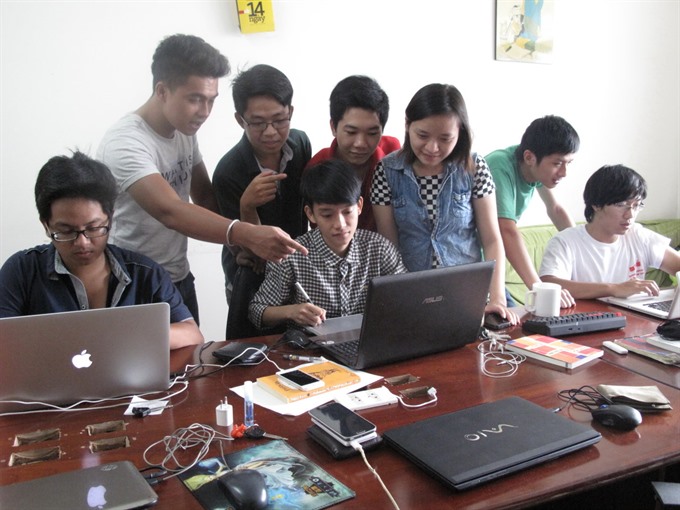 Economy
Economy

Many young people, including those who studied abroad and returned home to establish businesses, shared useful ideas on start-ups at a conference late last week in HCM City.
 |
| Staffers of Lozi, a start-up online food review community, at their office. — Tuoi Tre photo |
HÀ NỘI - Many young people, including those who’ve studied abroad and returned home to establish their own businesses, shared useful ideas on startups at a conference held last week in HCM City.
Nguyễn Trọng Nhân, director of Fablab Sài Gòn, said that starting a business means working for oneself and looking for new values, and these lessons need to be learnt from successful start-ups.
Young people are attracted by recent Government policies encouraging startups. However, while establishing a startup is fairly easy, making it internationally competitive needs support and advice from experienced experts, Nhân said.
Trần Bảo Trân, managing director of Sea Media Ltd Co, a former student in Switzerland, said there were three challenges that overseas students faced when coming back home to start a business - finding investors, enthusiastic employees and a conducive investment environment.
David Ngô, an American Information Technology expert, explained his reasons for starting a business in Việt Nam: "The Government wants Viet Nam to become a start-up nation and has adopted suitable policies on building smart cities. Therefore, the country’s policies are a driving force. Besides, the country is also developing in science and technology. If they receive investments, young people here will not be inferior to others in the world."
Ngê said the entrepreneurial spirit was high in Việt Nam.
"However, the boom is developing only in width, not in depth. I found out that many young entrepreneurs are just following the trend. The need orientation and direction from their predecessors. Lacking financial skills, they can easily go bankrupt. I wish to see more training sessions to guide young entrepreneurs in avoiding risks."
Dương Minh Trí of the HCM City Institute of Physics, Việt Nam Academy of Science and Technology, said the state’s role in developing a startup ecosystem is not intervention, but creating a transparent business environment.
For young investors, capital is important, but more important is knowledge about the market, experience from failures, innovation and competitiveness. Therefore, it is necessary to foster startup ideas among university and college students, and establishing funds to provide capital assistance, Trí said.
‘Thirst for startups’
Last Friday, HCM City Party Secretary Đinh La Thăng asked the Communist Youth Union to “inspire a thirst for start-ups” among city youth.
Young people should be creative and dare to take risks and not be afraid of failure, learning from the experience to fuel future success, Thăng said.
He said the union has to help the city’s Party organisation set up incubating policies for start-ups.
Responding to Thăng, the union’s standing deputy secretary, Lâm Đình Thắng, suggested that the city formulates specific guidelines for startups.
As of now, the city is only encouraging the youth to venture into startups based on their hobbies, he said
Another deputy secretary of the union, Phạm Hồng Sơn, suggested that the city leaders should talk to young startups and create more favourable conditions for them.
Thăng also said that the City was paying attention to developing human resources instead of promoting cheap labour.
The union has to pay attention to forecasting impacts of the fourth industrial revolution marked by emerging technology, which is affecting the lives of young people every day, he said. - VNS
Việt Nam: ASEAN’s Silicon Valley?
It appears that Việt Nam is best placed to become Southeast Asia’s Silicon Valley, the Asia Correspondent said in a recent article. It said the nation’s advantages stemmed from successful education policies, government support and an entrepreneurial spirit.
Việt Nam is also benefiting from funding and government policies designed to turn the country into a regional hub for technology and innovation. An example of this is the ambitious “Silicon Valley Project” sponsored by the Ministry of Science and Technology, which aims to transform the country into a major player in the digital economy.
The article also quoted Google chief executive Sundar Pichai as saying during his trip to Việt Nam last year that the country would soon become one of Google’s most important markets. Pichai also pledged to train 1,400 IT engineers for Việt Nam.
Việt Nam’s appeal is bolstered by its tech-savvy workforce, which is cheaper than China’s and more productive than that of other countries in the AEC, the article said.
Initially, the country had emerged as a production center for Korean and Japanese electronics groups like Samsung, LG Electronics, Panasonic and Toshiba, which have had factories in Việt Nam for decades.
However, the focus now is on transitioning from being a top producer of electronic components to becoming a center for research, innovation and development, the article added. - VNS




